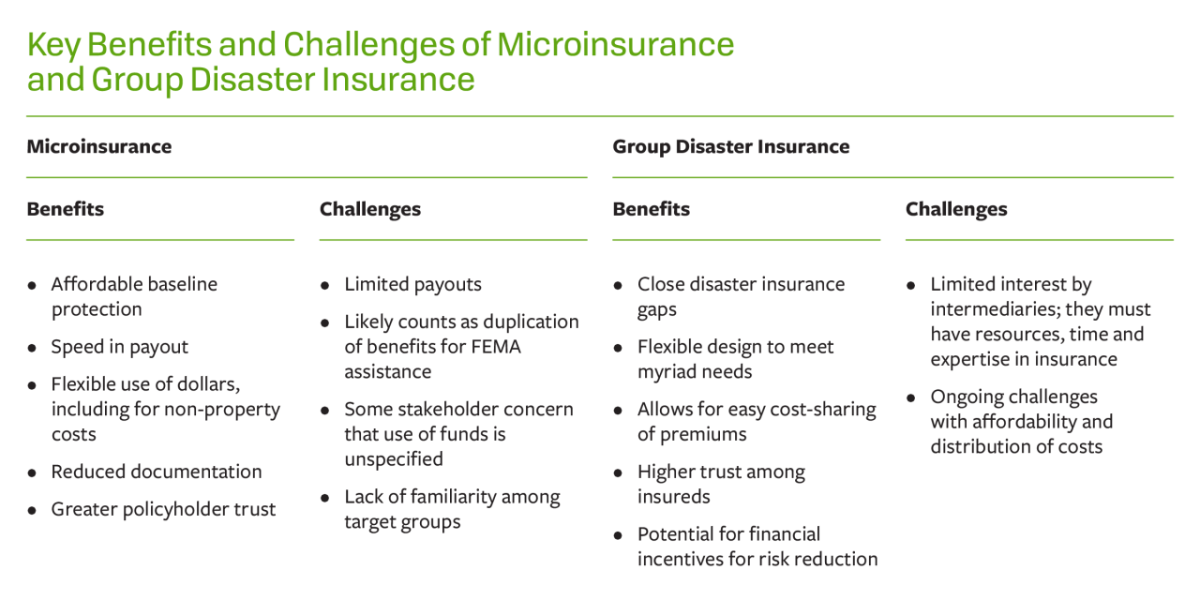New Report Outlines Inclusive Insurance’s Potential To Fill Gaps in the Recovery of South Carolina’s Households From Climate-Related Disasters
Proposed approaches could assist other states at risk for climate-related disasters
May 30, 2023 /3BL Media/ - Ceres and Environmental Defense Fund (EDF) released a new report today that provides a comprehensive review of the current resources available to households for post-disaster economic recovery in South Carolina and explores the extent to which innovative disaster insurance policy designs can fill gaps and bring greater equity to the state’s disaster recovery.
Addressing Financial Recovery Gaps for South Carolina Households: Models for Inclusive Disaster Insurance explores the current state of disaster-related financial recovery for South Carolina households; existing shortcomings and inequities in recovery fund distribution and access; and new types of disaster insurance policy structures that can make insurance more inclusive within the state. The report reveals several common challenges across all programs and sources for economic recovery, including:
- Many sources of funds for recovery are insufficient or inaccessible, especially for low-income and communities of color
- Disaster insurance can be unaffordable for low- and moderate-income households
- There are often substantial delays in getting any recovery funds
- The needs of renters and rural areas are not well met
The report explores potential applications, benefits, challenges, and implementation considerations of two insurance designs new to the U.S. residential market: microinsurance and group disaster insurance. Microinsurance is insurance designed with low-cost premiums and lower payouts, which provides affordable baseline disaster coverage. Group disaster insurance involves an intermediary institution between a group of households and the insurer; while the model can vary, the aggregation and pooling of services provides easier cost-sharing and wider take-up.
The research comes on the heels of “Inclusive Insurance for Climate-Related Disasters: A Roadmap for the United States,” a report written by Carolyn Kousky, Associate Vice President of Economics and Policy at Environmental Defense Fund, and Karina French, Manager, Climate Resilience Research at Environmental Defense Fund. Released in January 2023, the previous report demonstrates the national U.S. insurance industry’s inadequate coverage for climate-related disasters.
“Climate disasters are imposing increasing costs on households and our current approaches to financial recovery are leaving out certain populations and failing to cover all needs,” said Kousky. “While there is no silver bullet solution, there are innovative approaches that can be tailored to specific communities in order to improve their economic resilience. We look at two insurance-based approaches in this report. They will need to be adopted in tandem with other programs that reduce underlying risk and improve risk awareness."
“This report provides South Carolina’s regulators and policymakers a realistic view of the benefits and opportunities associated with these new insurance models and should be used to create a long-term plan to improve regional disaster recovery outcomes,” said Steven Rothstein, managing director, the Ceres Accelerator for Sustainable Capital Markets at Ceres. “While we looked specifically at South Carolina in this instance, states nationwide are facing very similar climate-related challenges. This report and the approaches it probes should be treated as case studies for state policymakers, regulators and insurers across the U.S.”
South Carolina has long suffered economic damage from both coastal and inland flooding, which are projected to increase with climate change in the coming years: Damaging flooding events on South Carolina’s coast are expected to occur around 10 times more often by 2050 than they do today. By 2100, more than 116,000 residential properties, concentrated around Charleston and the South Carolina Lowcountry, will experience chronic coastal inundation – meaning they flood at least 26 times per year – at an estimated cost of almost $53 billion.
The new report is authored by Kousky and French, as well as Xuesong You, Climate Research Economist at Federal Home Loan Mortgage Corporation.
About Ceres
Ceres is a nonprofit organization working with the most influential capital market leaders to solve the world’s greatest sustainability challenges. The Ceres Accelerator for Sustainable Capital Markets is a center of excellence within Ceres that aims to transform the practices and policies that govern capital markets to reduce the worst financial impacts of the climate crisis. It spurs action on climate change as a systemic financial risk—driving the large-scale behavior and systems change needed to achieve a net-zero emissions economy through key financial actors including investors, banks, and insurers. The Ceres Accelerator also works with corporate boards of directors on improving governance of climate change and other sustainability issues. For more information, visit ceres.org and ceres.org/accelerator and follow @CeresNews.
About Environmental Defense Fund (EDF)
One of the world’s leading international nonprofit organizations, Environmental Defense Fund (edf.org) creates transformational solutions to the most serious environmental problems. To do so, EDF links science, economics, law, and innovative private-sector partnerships. With more than 3 million members and offices in the United States, China, Mexico, Indonesia, and the European Union, EDF’s scientists, economists, attorneys and policy experts are working in 28 countries to turn our solutions into action.
Media Contacts:
Diane May, Ceres
Dmay@ceres.org
Sommer Yesenofski, Environmental Defense Fund
Syesenofski@edf.org



